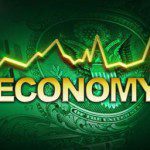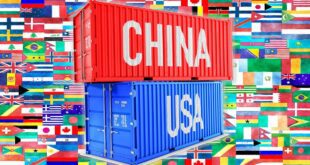Most economists (primarily Keynesians and monetarists) believe that authorities can control the money supply and interest rates, and most neo-Austrians believe that the Fed is all-powerful when it comes to inflating – that whatever inflation rate it wants, it simply manufactures. Is that true or false? Read on for the answer.
control the money supply and interest rates, and most neo-Austrians believe that the Fed is all-powerful when it comes to inflating – that whatever inflation rate it wants, it simply manufactures. Is that true or false? Read on for the answer.
By Robert Prechter (elliottwave.com) originally* entitled Myth #10: “Central banks and government policies control the markets.”.
Not long ago [in late 2008 — Ed.] the U.S. government announced that it would:
- fully back the debt of the mortgage companies it created (Fannie Mae, Freddie Mac);
- to use taxpayers’ money and borrow unlimited amounts to fund banks that it deems “too big to fail”;
- to fund via the FDIC shortfalls at all other banks.
At the same time, the world’s top central banks offered:
- unlimited credit at near-zero interest rates, in other words, free money.
According to the exogenous-cause model, these historic pledges and bailouts should have had immediate results. Take a look at Figure 20. Can you tell where on this graph of stock prices authorities took these actions?

According to the economists’ beliefs, the only rational place for them to have taken place would be at the bottom of the market. The minute the authorities began flooding the market with liquidity is the minute it should have turned up.
Figure 21 shows that in fact these actions took place in the early portion of the biggest stock market decline in 76 years. These actions did not push stock prices back up. The market finally bottomed months later, at a time when nothing along these lines happened.

It is no good to claim that these actions had results eventually. By that reasoning, any future turn in the stock market would prove the contention. Such reasoning is tautological, because the market fluctuates.
An exogenous-cause believer would do far better to explain this result by claiming that authorities’ actions of this type must be bearish, because every time they acted, the market fell; and when they finally stopped, it rose. Economists do not advance this argument, however, because they can’t make sense of it. Instead, they cling to their traditional cause-and-effect logic, while the markets just do what they want.
Conclusion
[In the 9 previous “True or False” articles (see introductory paragraphs and links to each below)], we have seen that:
- interest rates,
- oil price changes,
- the balance of trade,
- changes in earnings,
- changes in GDP,
- the onset or termination of war,
- peaceful times,
- terrorist attacks,
- inflation,
and this article on a central bank’s monetary policy and a government’s fiscal policy have no reliable effect on financial market prices…
According to our investigation, current news and political developments appear to carry no weight at all. I am unaware of any exogenous-cause claim that holds up under scrutiny. An event that seems to affect stock prices one way in the present, when investigated in the past, fails to provide any consistently reliable relationship. Even claims that seem inescapably reasonable, if not irrefutable, fail the test of even moderately rigorous empirical observation.
I have tested every exogenous-cause statement or assumption I have heard, not all of which are included here and, so far, none of them work. Many exogenous-cause statements contradict others, as we saw throughout this discussion. Proponents often adopt one argument and then the other, to fit market events.
We still await exogenous-cause proponents to make any statement of stock-market causality — or social-mood causality — that holds up consistently throughout the historical record.
[The above article is presented by Lorimer Wilson, editor of www.munKNEE.com and www.FinancialArticleSummariesToday.com and the FREE Market Intelligence Report newsletter (sample here – register here) and may have been edited ([ ]), abridged (…) and/or reformatted (some sub-titles and bold/italics emphases) for the sake of clarity and brevity to ensure a fast and easy read. The author’s views and conclusions are unaltered and no personal comments have been included to maintain the integrity of the original article. This paragraph must be included in any article re-posting to avoid copyright infringement.]
*Original Source: http://www.elliottwave.com/freeupdates/archives/2014/11/11/Don-t-Get-Ruined-by-These-10-Popular-Investment-Myths-%28Part-X%29.aspx#axzz3MBZVQ770 (© 2014 Elliott Wave International) **http://www.elliottwave.com/freeupdates/archives/2014/11/26/Don-t-Get-Ruined-by-These-10-Popular-Investment-Myths-(Conclusion).aspx#ixzz3MBaPfqfx (© 2014 Elliott Wave International)
Balance of “True or False” series of articles:
1. True or False: Inflation Makes Gold & Silver Go Up
This one seems like a no-brainer. The government or the central bank prints more bonds, notes and bills, and prices for things go up in response. Gold is real money, so it must fluctuate along with the inflation rate. It’s basic physics but it doesn’t happen that way. Let’s examine the history of inflation and the precious metals since the low of the Great Depression. Read More »
2. True or False: A Terrorist Attack Would Cause the Stock Market to Drop
It would seem logical to say that peace allows companies to focus on manufacturing goods, providing services, innovation and competition, all of which helps the overall economy but does peace, in fact, have anything to do with determining stock prices? Read More »
4. True or False: Rising Oil Prices Are Bearish For Stocks
A sensible story of causation regarding oil prices and stock prices made by countless economists is that “rising oil prices increase the cost of energy and therefore reduce corporate profits and consumers’ spending power, thus putting drags on stock prices and the economy.” Stunningly, as far as I can determine, however, no evidence supports that claim, as the discussion below will show. Read More »
5. True or False: An Expanding Trade Deficit Is Bearish For Stock Market?
Q: Is it correct to assume throughout that an expanding trade deficit impacts the economy negatively? A: No, the relationship, if there is one, is that there has been a positive — not negative — correlation between the stock market and the trade deficit. Let me explain. Read More »
6. True or False: Earnings Drive Stock Prices
The belief that earnings drive stock prices powers the bulk of the research on Wall Street but this glaring exception to the idea of a causal relationship between corporate earnings and stock prices challenges that theory. Let me explain. Read More »
7. True or False: Wars Affect Performance of Stock Markets
It is common for economists to offer a forecast for the stock market yet add a caveat to the effect that “If a war shock or terrorist attack occurs, then I would have to modify my outlook.” As such, it would seem logical to assume that…they must have access to a study showing that such events affect the stock market, right? The answer is no, for the same reason that they do not check relationships between interest rates, oil prices or the trade balance and the stock market. The causality just seems too sensible to doubt. Read More »
8. True or False: GDP Drives Stock Market Up & Down
Macroeconomic news supposedly explains only about one fifth of the movement in stock prices but if there is no accommodating theory, then the presumed causality involved is tenuous at best. Let me explain. Read More »
9. True or False: There Is A Direct Relationship Between Interest Rates & Stock Prices
Events and conditions do not make investors behave in any particular way that can be identified as shown in this analysis of the supposed relationship between interest rates and stock prices. So much for the popular claim that “Interest rates drive stock prices”! Read More »
 munKNEE.com Your Key to Making Money
munKNEE.com Your Key to Making Money


